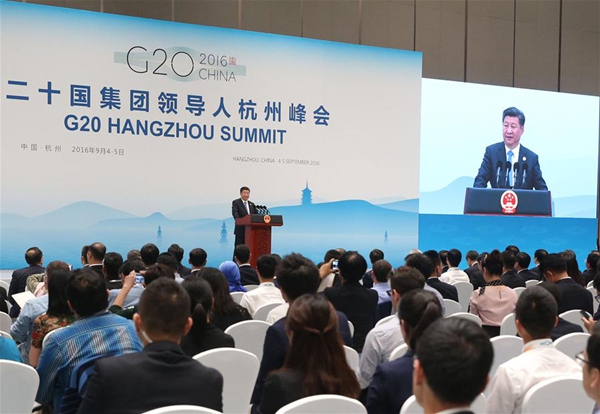China will actively implement G20 fruits
- By Kim Sangsoon
 0 Comment(s)
0 Comment(s) Print
Print E-mail China.org.cn, September 7, 2016
E-mail China.org.cn, September 7, 2016
|
|
|
Chinese President Xi Jinping attends a press conference after the 11th summit of the Group of 20 (G20) major economies in Hangzhou, capital of east China's Zhejiang Province, Sept. 5, 2016. (Xinhua/Yao Dawei) |
What plans did China offer at the G20 Hangzhou Summit?
The 11th G20 Summit opened in Hangzhou on the afternoon of Sept. 4 with a theme of "Towards an Innovative, Invigorated, Interconnected and Inclusive World Economy," and a leading question is how China, as host, intends to promote these aspects.
In his welcoming speech at the start of the meeting, President Xi Jinping said: "Based on the theme of the Summit, we will have discussions on strengthening policy coordination, creating a new path for growth, more effective and efficient global economic and financial governance, robust international trade and investment, inclusive and interconnected development, as well as other issues affecting the world economy."
It is certainly very necessary to achieve global coordination of macroeconomic policies and a linkage mechanism to improve global economic governance while exploring new engines of growth.
Therefore, President Xi hoped that the G20 Hangzhou Summit could prescribe "solutions addressing both the symptoms and root causes of global economic problems and achieve strong, sustainable, balanced and inclusive global growth."
In this regard, he set five goals.
First, facing many challenges, it was vital to strengthen macroeconomic policy coordination and jointly promote global growth and uphold international financial stability. Second, it was necessary to break a new ground for growth and generate new momentum. Third, the international community improves global economic governance and strengthens institutional safeguards. Fourth, it should build an open global economy and continue to promote facilitation and liberalization of trade and investment. Fifth, it was vital to implement the 2030 Agenda for Sustainable Development and promote inclusive development.
President Xi also said that "in preparing for the Hangzhou Summit, China has followed the principle of openness, transparency and inclusiveness, and maintained close contact and coordination with all other members." China had "held dialogues in various forms" with many countries "to brief them and all those interested in the G20 on our preparations."
He expected demonstrations of four kinds of unity among G20 members to safeguard global economic prosperity and stability. First, keep up with the spirit of the times and play a leadership role; second, transform knowledge into practice and implement practical actions; third, jointly build a cooperation platform to share achievements among participating members; and fourth, tide through difficulties together in partnerships.
It's obvious China expects all member states to reach greater consensus on the summit's themes through in-depth communications, creating new engines driving the global economy and providing new directions for global growth.
How will the Hangzhou Summit change the world?
The Hangzhou Summit was a great success. Leaders of member states as well as international organizations reached many important agreements on major issues.
President Xi, in his closing speech, pointed to the G20 Leaders' Communiqué, G20 Blueprint on Innovative Growth, G20 Strategy for Global Trade Growth, G20 Guiding Principles for Global Investment, G20 Initiative on Supporting Industrialization in Africa and the Least Developed Countries, and Global Infrastructure Connectivity Alliance Initiative. At the same time, the meeting produced a groundbreaking Action Plan for the Agenda for Sustainable Development Goals.
Therefore, the five "determinations" by President Xi could be regarded as an important achievement. First, the G20 members are determined to set the course for the world economy. Second, they are determined to forge a new path for growth and instill new dynamism into the world economy. Third, they are determined to improve global economic and financial governance to enhance the resilience of the world economy. Fourth, they are determined to revitalize international trade and investment as key engines of growth, and build an open world economy. Fifth, they are determined to promote inclusive and interconnected development, so that G20 cooperation will deliver benefits to the whole world.
However, the most important aspect is direction of future development. In another words, how will the achievements of the Hangzhou Summit change the world? The answer surely lies in President Xi's own words:
"These action plans and practical outcomes will help reduce inequality and imbalance in global development, deliver tangible benefits to people of the developing world, make important progress toward realizing the Sustainable Development Goals by 2030, and contribute to the common development of mankind."
The question is: how will the G20 Leaders' Communiqué, among various initiatives, be carried out?
To actually implement the fruits of the Summit, we should continue to ponder over the following questions. First, should the Communiqué and initiatives be further institutionalized? Second, how will G20 involve other countries in the global macro-adjustment? Third, who will be coordinating and executing the fruits of the Hangzhou Summit?
Prior to the G20 Hangzhou Summit, this writer put forward three action plans for the aforementioned concerns. First, the G20 Summit has to be responsible for the top-level design. Second, establish a new "G20 +1+1 Meeting" to allow in each member state's commerce and trade and foreign ministers to take charge of the global coordination in economic development. Third, establish a G20 Secretariat responsible for adjusting and implementing different issues in each country.
China can play a big role in this regard. Before next year's G20 summit in Germany, China should actively promote the Hangzhou Communiqué both as the second largest economy and the 2016 G20 host country.
Kim Sangsoon is a researcher at the Charhar Institute and the president of the Korea-based East Asia Peace Research Association.
The article was translated by Chen Boyuan. Its original unabridged version was published in Chinese.
Opinion articles reflect the views of their authors, not necessarily those of China.org.cn.







Go to Forum >>0 Comment(s)